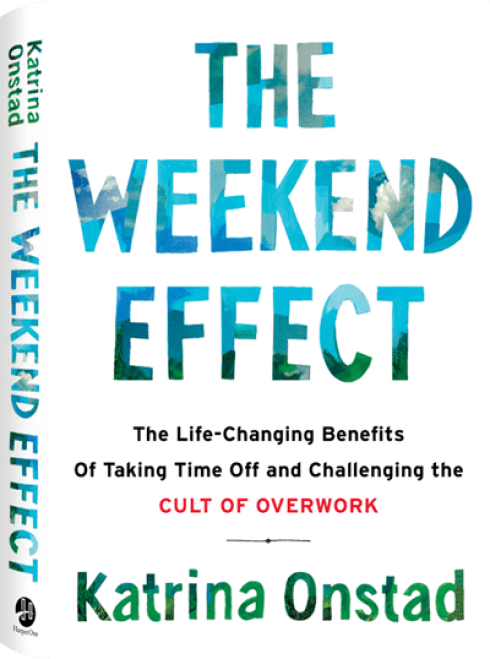The irony that I didn’t have time to finish reading Katrina Onstad’s The Weekend Effect—a book that’s part personal journey, part investigation into our culture of being overworked and overscheduled—before she and I met wasn’t lost on either of us.
“We’ve got to be kinder to ourselves,” Onstad, an award-winning journalist, told me, making me feel better for not having enough time between work, errands, life and a baby to sit down and finish her well-researched book.
Time, she added, is a lost commodity and, especially as women, the time we do have is plugged to the brim to ensure we’re making the most of it. And the weekend isn’t an exception anymore. The gig economy has made the work week indiscernible from the weekend, life and family commitments fill the gaps in-between, and we need to ask ourselves, “How can we live better?”
The biggest thing Onstad noticed on her quest to take back the weekend—something that was spurred by her son questioning, “Wait, that was our weekend?!”—was the gender leisure gap.
“It plays a huge role in how men and women see leisure, and their right to it,” she said, adding that men tend to make time to go and shoot hoops or hit some golf balls, so why do we as women tend to feel guilty for taking some “me” time?
The Weekend Effect digs into the psychology and anthropological reasons behind why we see busy-ness as a sign of success, rather than applauding the person who takes time to unplug, spend time in nature, with their family, or in front of their favourite painting, (without documenting it on social media).
It’s also no secret that longer hours don’t necessarily mean better work, so why do we feel the need to boast about how busy we are? Why are we proudly on call 24-7? Overworked employees don’t make better workers. Your business won’t crumble if you relax on a Sunday.
Sweden is one of the first places to embrace change on a governmental level, with a four-day week imposed in Gothenburg. France has legislation dedicated to the right to disconnect at night and on weekends. So why is it so different in North America? Onstad explains how we need the government to spur on change at a societal level, but asks what can we do on a personal level, without being deemed lazy or undedicated?
Her research into this matter, she said, was personally life-changing. As someone who suffers from perpetual busy-ness myself, I asked Onstad for a recipe for how we can start taking more "me" time.
“Be as committed to leisure as we are to our work. Take a step back and ask, ‘How can I lead a full life?’ Volunteer. Get involved in your community. Connect with people. And do less! Take the time to stand in front of your favourite piece of art for an hour. It might only be an hour, but it’s something," she said.
It’s not about forcing a visit to the spa, or binge-watching your favourite show. It’s about unplugging and being present. The quality of the time you spend, not the quantity. In Onstad’s own words, “You may not be able to realistically unplug and take time for yourself all the time, but start thinking about it, make time for it once in a while, and don’t feel guilty.”
My agenda for this weekend? Take time to finish reading The Weekend Effect. —Aleeza Khan



Be the first to comment